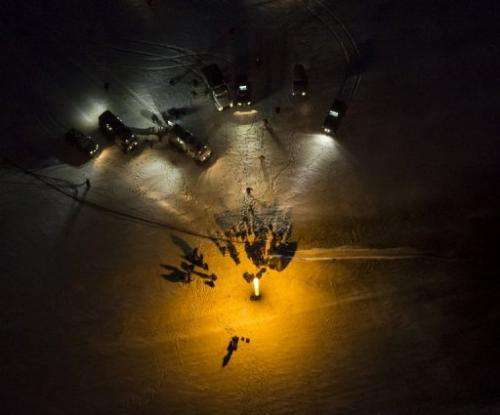Russia warns Kazakhstan in Baikonur cosmodrome dispute

Russia has warned Kazakhstan it could withdraw from joint projects if Astana insists on restricting satellite launches from Russia's rented Baikonur cosmodrome, Izvestia daily reported Thursday.
The Russian newspaper, known for its close connections with the Kremlin, published the text of a diplomatic note from Russia a day ahead of a planned meeting between Russian Foreign Minister Sergei Lavrov and his Kazakh counterpart Yerlan Idrisov in Moscow.
"In the current situation, Russia will be forced to reassess its position on the use of continuing bilateral cooperation on joint projects," Izvestia quoted the Russian foreign ministry as saying, listing joint space projects.
A spokesman for the Kazakhstan foreign ministry told Interfax news agency that the note was dated January 18.
Kazakhstan has restricted the number of permitted commercial satellite launches by Russia in a simmering dispute about the fall zone of debris from the launches.
For 2013, it has permitted 12 launches of Proton-M rockets, down from 14 last year.
Sources in the Russian space agency told Izvestia that the restrictions meant tearing up five contracts and returning up to $500 million to clients.
Roscosmos spokesman Alexei Kuznetsov confirmed to AFP that Kazakhstan had cut the number of planned Proton-M launches in 2013 to 12, down from the 17 requested by Russia.
Russia rents the Baikonur cosmodrome from ex-Soviet Kazakhstan, using the complex in the middle of the steppe for military and commercial satellite launches and ferrying astronauts to and from the International Space Station.
There is no suggestion that the dispute could affect launches to the ISS.
The Russian foreign ministry argued that "Kazakhstan is vetoing launches that do not contradict the rent agreement," Izvestia wrote.
"Russia sees this decision as Kazakhstan's aiming to bypass the terms of renting Baikonur."
Kazakhstan has moved in recent years to assert greater control over Baikonur and over activities at the space base, which Russia rents for around $115 million per year in an agreement drawn up in the 1990s that is valid until 2050.
While the concerns over rocket launches are ostensibly about environmental impact and safety, Kazakhstan is at the same time reminding Russia of its reliance on Baikonur in a dispute over financial and geopolitical issues, commentators say.
Russia is building a cosmodrome on its own soil in the Far Eastern Amur region that in the future could take over from Baikonur.
Russia's embattled space programme has experienced a string of embarrassing failed satellite launches in recent years, including three satellites for Russia's much vaunted navigation system GLONASS.
(c) 2013 AFP

















